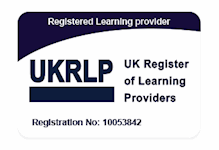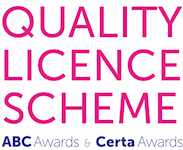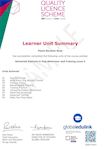Agricultural Pest Control
Quality License Scheme | Endorsed Certificate | Certified Unit Summary | 24/7 Access
Global Edulink
Summary
Overview
A message to our learning community
With the current outbreak of Coronavirus hitting countless countries and economies around the world, we stand together with all those who have been impacted by COVID-19. We also want to remember and appreciate the healthcare professionals and other individuals in essential services who are braving this pandemic from the forefront with their selfless acts of service.
-------------------------------------------------------------------------------------------------------------------------------
This course is endorsed under Quality Licence Scheme.
Stand the chance to get a free Level 4 or above course when you enroll with us!!!
Pest control refers to the activities that are taken in order to control and manage the species known as pests. Pests are a part of the animal kingdom that hinder or greatly impact the activities of human beings. Pests are also responsible for some of the illnesses that frequently occur in humans around the world. Therefore, appropriate methods and strategies have been identified and implemented in order to sufficiently control pests and the associated harm. Pest control is mainly implemented through cultural, biological and chemical means.
Pest control is very important aspect of agriculture. A considerable amount of the agriculture foods are consumed by pests each year. These pests also carry dangerous diseases that can be easily transmitted to humans by consuming food that have been in contact with these pests. The Diploma in Agricultural Pest Control – Level 4 will educate farmers on pest control and raise awareness as it plays a huge role in their harvest. Extensive knowledge regarding pest control is also important in order to embark on a successful career in agriculture or pest control in agriculture.
The Diploma in Agricultural Pest Control – Level 4 will give learners in-depth information on the fundamentals of pest control. Learners will be introduced to pesticide controls and the application of agricultural pesticide. Have a clear understanding about the common crop insects and how to control them. The course will give insight into EPA and WPS training. Learners can also discover safety and health practices that have to be followed while incorporating pest control in agriculture.
The course has been endorsed under the Quality Licence Scheme. This means that Global Edulink has undergone an external quality check to ensure that the organisation and the courses it offers, meet defined quality criteria. The completion of this course alone does not lead to a regulated qualification* but may be used as evidence of knowledge and skills gained. The Learner Unit Summary may be used as evidence towards Recognition of Prior Learning if you wish to progress your studies in this subject. To this end the learning outcomes of the course have been benchmarked at Level 4 against level descriptors published by Ofqual, to indicate the depth of study and level of demand/complexity involved in successful completion by the learner.
The course itself has been designed by Global Edulink to meet specific learners’ and/or employers’ requirements which cannot be satisfied through current regulated qualifications. Quality License Scheme endorsement involves robust and rigorous quality audits by external auditors to ensure quality is continually met. A review of courses is carried out as part of the endorsement process.
*Regulated qualification refers to those qualifications that are regulated by Ofqual / CCEA / Qualification Wales
We are always thinking of ways in which you can gain the best from our online learning platform. When you enroll with us on this program you will have the opportunity to enroll on a Level 4 course or above for free!!! The courses that you can choose from have been indicated on our suggested course below.
- Diploma In Excavation & Trenching - Level 4
- Diploma in Collection System Operator - Level 4
- Diploma in Chlorination - Level 4
- Diploma in Chemical Handling - Level 4
- Diploma in Agricultural Pesticide Awareness - Level 4
- Diploma in Mastering Thinking Skills Level 4
- Diploma in Agricultural Pest Control - Level 4
- Diploma In Systems Analysis And Design – Level 4
- Diploma in Business Management - Level 5
Achievement
Course media
Description
What is covered in this course?
- Have a clear understanding of the fundamentals of pest control
- Learn about pesticide controls
- Learn about the agricultural pesticide application
- Gain insight into common pesticide applications and methods
- Have an understanding on the safety and health measures that has to be practiced while incorporating pest control in agriculture
- Insight into EPA and WPS required training
- Learn about beneficial insect identification
- Understand about pests such as honey bees, Africanised honey bees, wasps, cotton insects and other common crop insects and how to control them
Access Duration
The course will be directly delivered to you, and you have 12 months access to the online learning platform from the date you joined the course. The course is self-paced and you can complete it in stages, revisiting the lectures at any time.
Course Curriculum (Type Of Course Material: Text)
Unit 1 Pesticide Fundamentals Introduction
- Insecticides
- Pesticide Rule Index
- Questions for Quiz
Unit 2 Agricultural Pesticide Application Information
1.1. Changes to EPA’s Farm Worker Protection Standard
1.2. Agricultural Employers Responsibility
1.3. Four Basic WPS Requirement
1.4. General Duties of WPS
1.5. Understanding the Worker Protection Standard?
1.6. Mitigation
1.7 Does the Worker Protection Standard Apply to you?
1.8. Who Does the WPS Protect?
1.9. Who is not a Handler?
1.10. Short Summary of WPS Requirements
1.11. Special Applications Restrictions in Nurseries and Greenhouses
1.12. WPS -Central Posting on Large or Non-contiguous Establishments
1.13. Federal Pesticide Recordkeeping Requirements
1.14. Topic 2- Agricultural Pesticide Application Introduction Post Quiz Answers in rear near Reference
Unit 3 Common Pesticide Applications and Methods
- Insect Growth Regulators
- IPM Methods (Types of Pest Control)
- Adjuvants
Unit 4 EPA Required Training Citation Section
- WPS Responsibility
- What Employers must do for both Workers and Handlers?
- Pesticide Safety, Application and Hazard Information
- Decontamination Supplies and Requirements
- WPS Requires Providing Decontamination Sites
- Decontamination Solutions
- Further Requirements for Employers of Workers
- Notice about Applications
- Sign Size
- Restricted–Entry Interval (REI)
- Workers May Designate a Representative
- Notification of Pesticide Applications
- Entry Restrictions in the Treated Area
- Topic 4- EPA Required Training Citation Section Post Quiz
Unit 5 PPE, Safety and Health Section
- Personal Protective Equipment (PPE) Definitions
- Personal Protective Equipment (PPE)
- Table 1. Minimum PPE and work clothing for pesticide-handling activities.
- The Central Notification Board
- Personal Protective Equipment Requirements
- PPE Cleaning Information
- Application Exclusion Zone” or AEZ
- Heat-Related Illnesses and First Aid
- How to Triple-Rinse
- Topic 5- PPE, Safety and Health Section Post Quiz
Unit 6 WPS Required Training Section
- 2017 Training Requirements and Resources
- 2018 Training Requirements and Resources and Beyond
- 2018 Handler Training
- 2017 Pesticide Safety Training Review
- Labeling Information Section
- Label Requirements
- Appendix A Criteria for WPS Pesticide Safety Poster
- Appendix B More information in rear of Manual
- Which Pesticides Uses are Not Covered?
- Workers and Handlers Section
- Employers of Commercial Pesticide Handlers
- Early –Entry Work Situations
- Further Requirements for Employers of Workers
- General Protections for Early-Entry Workers
- Exception for an Agricultural Emergency 170.603(c)
- PPE FOR EARLY-ENTRY WORKERS 170.605(d) & (e)
- Further Requirements for Employers of Handlers Citation 32. 37 Restrictions during Applications and Monitoring Handlers
- Handling, Transporting, Storing and Disposing of Pesticides
- Personal Protection Equipment (PPE)
Unit 7 Beneficial Insect Identification
- Soldier Beetle
- Syrphid flies –Hoverflies
- Centipede
- Topic 7 Post Quiz
Unit 8 Honey Bee Detailed Section
- Genus Apis
- Micrapis, Megapis and Apis
- Understanding Both AHB and EHB Bee Colony
- Flight Behavior
- Habit Summary
- Topic 8 Honey Bee Detailed Section Post Quiz
Unit 9 Africanized Honey Bee Section
- Potential Range of Africanized Bees in the United States
- Understanding Africanized Honey Bees
- Selection of Nesting Site
- Reproductive Capacity
- Topic 9 Africanized Honey Bee Section Post Quiz
Unit 10 Modern European Bee Hive Section
- Composition of Propolis
- Topic 10 Modern European Bee Hive Section Post Quiz
Unit 11 Bee Control Section
- Removal of the Comb
- Specific Bee Treatments
- Insecticides that Kill Bees Intentionally and otherwise
- Carbaryl
- Deltamethrin (Delta Dust or Drione Dust)
- Permethrin
- Pyrethroids
- Topic 11 Bee Control Section Post Quiz
Unit 12 Bee-Related Inspections Section
- Pre-Inspection Planning
- Identifying and Inspecting Potential Pesticide Sources
- Sample Handling
- Beekeeping
- Topic 12 Bee-Related Inspections Section Post Quiz
Unit 13 Wasp Identification Section
- Yellowjackets
- Paper Wasp
- Yellowjacket Management
- Other Wasps
- Topic 13 Post Quiz
Unit 14 Common Crop Insects and Pesticide Controls
- Aphid
- Cotton Aphid
- Green Peach Aphid
- Cabbage Looper
- Young Cabbage Loopers
- Colorado Potato Beetle
- Mexican Bean Beetle
- Topic 14 Post Quiz
Unit 15 Cotton Insect and Related Pest Identification
- Boll Weevil
- Bollworm/Tobacco Budworm
- Topic 15 Post Quiz
Unit 16 1 node Ant Identification and Control Section
- Termites
- Ant Control
- Ant Classification
- Argentine Ant - 1 node ant
- Ghost Ant Tapinoma melanocephalum - 1 node ant
- Harvester Ant- 1 node ant
- Topic 16 - 1 node Ant Identification and Control Section Post Quiz
Unit 17 2 node Ant Identification and Control Section
- Acrobat Ant – 2 node ant
- Bigheaded Ant – 2 nodes
- Little Black Ant
- Little Black Ant Identification and Control – 2 node ant Monomorium minimum
- Pavement Ant – 2 node ant
- More on Ant Prevention
- Topic 17 - 2 node Ant Identification and Control Section Post Quiz
- Pesticide/Insect Glossary
- Charts and Forms Section
- Answer to Quizzes
Method of assessment
In order to complete the Diploma in Agricultural Pest Control – Level 4 successfully, all students are required to complete a series of assignments. The completed assignments must be submitted via the online portal. Your instructor will review and evaluate your work and provide your feedback based on how well you have completed your assignments.
Please Note: Additionally, £179 (Inc. VAT) is charged for assessment and certificate and you need to pay that when you are submitting your assessments only (It is not required to pay initially when you are registering). This payment can be paid into 04 installments when you are submitting your assessments.
Certification
At the end of this course successful learners will receive a Certificate of Achievement from Quality License Scheme and a Learner Unit Summary (which lists the components the learner has completed as part of the course).
Course Code: QLS-04870
Accredited body (Accreditation)
Quality License Scheme have long-established reputations for providing high quality vocational qualifications across a wide range of industries. Quality License Scheme combine over 180 years of expertise combined with a responsive, flexible and innovative approach to the needs of our customers.
Renowned for excellent customer service, and quality standards, Quality License Scheme also offer regulated qualifications for all ages and abilities post-14; all are developed with the support of relevant stakeholders to ensure that they meet the needs and standards of employers across the UK.
Who is this course for?
- Students
- Job seekers
- Farmers
- Other professionals related to agricultural pest control
- Anyone willing to learn more about agricultural pest control
Requirements
- Learners should be age 19 or over, and must have a basic understanding of Maths, English, and ICT.
- A recognised qualification at level 3 or above in any discipline.
Career path
- Farmers – £8.57 per hour
- Farm Workers – £8.39 per hour
- Farm Manager – £27,636 per annum
- Pest Control Technician – £18,743 per annum
- Agricultural Pest Controller
- Agricultural Pest Control Specialist
Other jobs you can get
- Pest Control Technician
- Pest Control Advisor
Questions and answers
I have a degree of agriculture course then I require of diploma pest control
Answer:Dear Mö?d, Thank you for your query. The Diploma in Agricultural Pest Control - Level 4 is an ideal qualification for getting fundamental and standard knowledge in the field. At the end of this course, successful learners will receive a Certificate of Achievement from ABC Awards and Certa Awards and a Learner Unit Summary (which lists the components the learner has completed as part of the course). Regards, Student Support Team.
This was helpful.
Reviews
Currently there are no reviews for this course. Be the first to leave a review.
Legal information
This course is advertised on reed.co.uk by the Course Provider, whose terms and conditions apply. Purchases are made directly from the Course Provider, and as such, content and materials are supplied by the Course Provider directly. Reed is acting as agent and not reseller in relation to this course. Reed's only responsibility is to facilitate your payment for the course. It is your responsibility to review and agree to the Course Provider's terms and conditions and satisfy yourself as to the suitability of the course you intend to purchase. Reed will not have any responsibility for the content of the course and/or associated materials.







